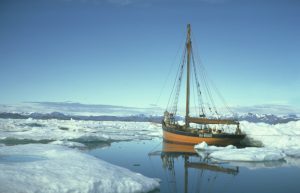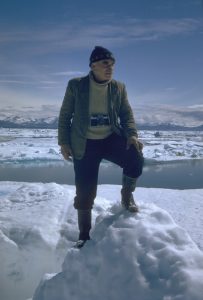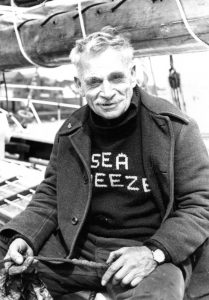Bill Tilman’s climbing and sailing achievements rank amongst the greatest in the fields of twentieth century mountaineering and deep sea cruising and his books remain essential reading for many who embark on similar ventures. By the time of his disappearance in the South Atlantic in 1977, he had left a legacy of some of the finest travel books ever written. The seven ‘Mountain / Travel’ books document the first stage of his travels, taking the reader from the coffee plantations and gold mines of Africa to the Himalaya and the highlights of Nanda Devi and Everest. The eight ‘Sailing / Mountain Exploration’ books cover the second stage, a series of high latitude voyages in traditional Bristol Channel pilot cutters.
A highly decorated military leader, his covert operations behind enemy lines with Albanian partisans during the second World War are covered in ‘Where Men and Mountains Meet’, while his survival of the brutality of the Great War is quickly dismissed in the opening paragraph of his first book – ‘Snow on the Equator‘:
“To those who went to the War straight from school and survived it, the problem of what to do afterwards was peculiarly difficult. A loss of three or four years upset preconceived plans, and while the War was in progress little thought was devoted to such questions. Not that there was no opportunity for thinking, for there was ample time for that during solitary night watches at observation post or gun line; during periods of what was euphemistically called ‘resting’ behind the lines; or, where most of us went sooner or later, in hospital. No, the reason was because making plans seemed rather a waste of time. Either the War would go on interminably, in which case one was already arranged for, or, in the other alternative, consolation might be found in the philosophy of Feeble, that ‘he who dies this year is quit for the next'”.
Tilman’s experiences in the Great War had a profound effect on him, reinforcing his sense of basic values and his approach to the assessment of risks, and providing an incentive to turn his back on the humdrum life of the family business in favour of a life of his own making:
“Coming home, then, from the Rhine in April 1919, with what the polite friend might call an ‘open’ and the candid a ‘blank’ mind, it was not altogether surprising that in August of the same year I found myself on a cargo-boat bound for East Africa, or B.E.A. as it was then called. My destination was simply accounted for by the fact that I had drawn a farm, or rather a square mile of land, in a lottery for ex-servicemen; and the conveyance, because that seemed to be the quickest way of getting there. And since our destination was believed to be a place where, speaking metaphorically, pearls could be picked up on the beach, it was impossible for one to be on the spot too soon.”
These first two paragraphs of ‘Snow on the Equator’ set the scene for a life to be spent travelling and exploring in some of the world’s most remote and inaccessible landscapes. His own writing provides the definitive biography of the man but is a source that requires careful interpretation given the modesty with which he writes of his own accomplishments. Those familiar with his books will realise that Tilman had a masterly gift of understatement – an ability to dismiss in a dry, humorous line an obstacle to progress which lesser writers would embellish into a chapter. To those who knew him well, neither of his official biographers managed to get close to his real character.
 Bob Comlay was one of only a handful of crew-members who chose to return for a second voyage, earning a level of trust that gives him unique insight into the true character of this self-effacing legend of twentieth century exploration. In 1997, Bob published a simple website containing images and anecdotes from the 1970 and 1971 voyages to West Greenland and East Greenland with later additions from a few other former Tilman crewmembers. While this hobby project remained incomplete, the level of interest that it drew from around the world over the past 12 years demonstrates the level of influence that Tilman and his travels still has on a wide variety of people. In recent years, the growth in interest has been significant, particularly amongst audiences of a new generation. John Mead’s 1981 TV documentary, ‘No Pay, No Prospects, not much Pleasure’ and Bob Comlay’s illustrated reminiscences, ‘Travels with Tilman’, have each been aired several times since Barmouth’s Tilman Festival’ weekend in May 2008.
Bob Comlay was one of only a handful of crew-members who chose to return for a second voyage, earning a level of trust that gives him unique insight into the true character of this self-effacing legend of twentieth century exploration. In 1997, Bob published a simple website containing images and anecdotes from the 1970 and 1971 voyages to West Greenland and East Greenland with later additions from a few other former Tilman crewmembers. While this hobby project remained incomplete, the level of interest that it drew from around the world over the past 12 years demonstrates the level of influence that Tilman and his travels still has on a wide variety of people. In recent years, the growth in interest has been significant, particularly amongst audiences of a new generation. John Mead’s 1981 TV documentary, ‘No Pay, No Prospects, not much Pleasure’ and Bob Comlay’s illustrated reminiscences, ‘Travels with Tilman’, have each been aired several times since Barmouth’s Tilman Festival’ weekend in May 2008.
One reason for the resurgence in interest may be that the advent of GPS technology and the ready availability of satellite mapping and imaging has closed forever that ‘heroic’ era of expedition travel in which Tilman achieved many notable objectives. Tilman’s apocryphal comment on the early Himalayan expeditions, that “any worthwhile expedition can be planned on the back of an envelope.” applied equally to his high latitude voyages. Apart from sextant, compass and a short wave radio receiver for time signals and shipping forecasts, his boats carried no technology, no liferaft and only very basic rations for the crew.
 To find a crew, Tilman would either rely on recommendations from personal networks or would resort to the insertion of a brief notice in the Times, typically ‘Hand wanted for long voyage in small boat: no pay, no prospects, not much pleasure’. That the crew were not asked to contribute financially towards the voyages led Tilman to expect that they would accept his leadership and judgement without question. Where crews pulled together, taking the rough with the smooth as Tilman expected of them, much was achieved. There were, however, a few ‘polite mutinies’ along the way.
To find a crew, Tilman would either rely on recommendations from personal networks or would resort to the insertion of a brief notice in the Times, typically ‘Hand wanted for long voyage in small boat: no pay, no prospects, not much pleasure’. That the crew were not asked to contribute financially towards the voyages led Tilman to expect that they would accept his leadership and judgement without question. Where crews pulled together, taking the rough with the smooth as Tilman expected of them, much was achieved. There were, however, a few ‘polite mutinies’ along the way.
For sailing, climbing and other groups keen to find out more, the illustrated talk on ‘Travels with Tilman’ will bring to life the real experience of travelling with Bill Tilman. Containing further unpublished photographs and detail from personal correspondence, the talk offers a unique opportunity to gain awareness and understanding of this remarkable man based on a friendship that endured until Tilman’s loss at sea in 1977.
All fifteen of Bill Tilman’s books are now being reprinted in an extended edition. Dick Wynne, the mastermind behind Lodestar Books, working in partnership with Vertebrate Publishing, has been preparing the new Collected Edition under a new imprint, Tilman Books. Each volume in the new edition has a new Foreword, and in many cases an Afterword, written by those who either knew Tilman or have unique insight into his approach to climbing, sailing and navigation. The books are being republished in pairs, one book from the climbing series together with one from the sailing volumes, on a quarterly basis from June 2015 to June 2017. The sixteenth book in the Tilman edition will be a reprint of the first official biography, written by JRL Anderson and published posthumously in 1981. For details of the new Collected Edition, including how to order the books on-line, please follow this link.
To contact the author of this site, or to inquire about the ‘Travels with Tilman’ talk, please take the ‘Contact’ menu option.

